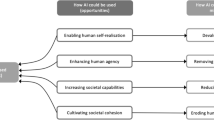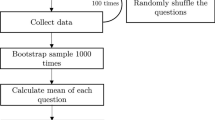Abstract
“Moral hazard” links geoengineering to mitigation via the fear that either solar geoengineering (solar radiation management, SRM) or carbon dioxide removal (CDR) might crowd out the desire to cut emissions. Fear of this crowding-out effect ranks among the most frequently cited risks of (solar) geoengineering. We here test moral hazard versus its inverse in a large-scale, revealed-preference experiment (n ~ 340,000) on Facebook and find little to no support for either outcome. For the most part, talking about SRM or CDR does not motivate our study population to support a large US environmental non-profit’s mission, nor does it turn them off relative to baseline climate messaging, except when using extreme messengers and framings. Our results indicate the importance of actors and reasoned narratives of (solar) geoengineering to help guide public discourse.









Similar content being viewed by others
Data availability
All replication data available upon request.
Notes
We used the large US environmental NGO’s Facebook page for this set of experiments in exchange for us compensating the NGO for the ad purchases, and under the condition of anonymity.
While it might have been good to be able to distinguish genuine interest in geoengineering from conspiratorial content, social media discourse on geoengineering appears to be dominated by the latter (Tingley and Wagner 2017). Hence, we analyze this group separately and excluded either form of prior engagement from the other groups.
Merk et al. (2019), in a stated-preference survey, shows that laypeople exhibit moral hazard behavior, while experts do not.
References
Andrews TM, Delton AW, Kline R (2022) Anticipating moral hazard undermines climate mitigation in an experimental geoengineering game. Ecol Econ 196:107421
Barberá P (2020) Social media, echo chambers, and political polarization. In: Tucker, Joshua A., and Nathaniel Persily (Eds). Social media and democracy: the state of the field, prospects for reform, pp. 34–55
Buck HJ (2019) After geoengineering: climate tragedy, repair, and restoration. Verso Books
Burns ET, Flegal JA, Keith DW, Mahajan A, Tingley D, Wagner G (2016) What do people think when they think about solar geoengineering? A review of empirical social science literature, and prospects for future research. Earth’s Future 4(11):536–542
Cherry TL, Kallbekken S, Kroll S, McEvoy DM (2021) Does solar geoengineering crowd out climate change mitigation efforts? Evidence from a stated preference referendum on a carbon tax. Clim Change 165(1):1–8
Cherry TL, Kroll S, McEvoy DM, Campoverde D, Moreno-Cruz J (2023) Climate cooperation in the shadow of solar geoengineering: an experimental investigation of the moral hazard conjecture. Environ Polit 32(2):362–370
Crutzen Paul J (2006) Albedo enhancement by stratospheric sulfur injections: a contribution to resolve a policy dilemma? Clim Chang 77(3–4):211
Dannenberg A, Zitzelsberger S (2019) Climate experts’ views on geoengineering depend on their beliefs about climate change impacts. Nat Clim Chang 9(10):769–775
Guess AM, Malhotra N, Pan J, Barberá P, Allcott H, Brown T, Crespo-Tenorio A et al (2023) Reshares on social media amplify political news but do not detectably affect beliefs or opinions. Science 381(6656):404–408
Hart PS, Campbell-Arvai V, Wolske KS, Raimi KT (2022) Moral hazard or not? The effects of learning about carbon dioxide removal on perceptions of climate mitigation in the United States. Energy Res Soc Sci 89:102656
IPCC (2022). Summary for Policymakers. In P. R. Shukla, J. Skea, R. Slade, A. Al Khourdajie, R. van Diemen, D. McCollum,… J. Malley (Eds.), Climate change 2022: mitigation of climate change. Contribution of Working Group III to the Sixth Assessment Report of the Intergovernmental Panel on Climate Change. Cambridge, UK, New York, NY, USA: Cambridge University Press. https://doi.org/10.1017/9781009157926.001
Jebari J, Táíwò OO, Andrews TM, Aquila V, Beckage B, Belaia M, Clifford M et al (2021) From moral hazard to risk-response feedback. Clim Risk Manag 33:100324
Keith DW (2000) Geoengineering the climate: History and prospect. Annu Rev Energy Environ 25(1):245–284
Lawrence MG (2006) The geoengineering dilemma: to speak or not to speak. Clim Chang 77(3–4):245
Lawrence MG, Crutzen PJ (2017) Was breaking the taboo on research on climate engineering via albedo modification a moral hazard, or a moral imperative? Earth’s Future 5(2):136–143
Lin AC (2013) Does geoengineering present a moral hazard. Ecology LQ 40:673
Mahajan A, Tingley D, Wagner G (2019) Fast, cheap, and imperfect? US public opinion about solar geoengineering. Environ Polit 28(3):523–543
Marshall JM (1976) Moral hazard. Am Econ Rev 66(5):880–890
McLaren D (2016) Mitigation deterrence and the “moral hazard” of solar radiation management. Earth’s Futur 4(12):596–602
Mercer AM, Keith DW, Sharp JD (2011) Public understanding of solar radiation management. Environ Res Lett 6(4):044006
Merk C, Pönitzsch G, Rehdanz K (2016) Knowledge about aerosol injection does not reduce individual mitigation efforts. Environ Res Lett 11(5):054009
Merk C, Pönitzsch G, Rehdanz K (2019) Do climate engineering experts display moral-hazard behaviour? Climate Policy 19(2):231–243
Mildenberger M, Tingley D (2019) Beliefs about climate beliefs: the importance of second-order opinions for climate politics. Br J Polit Sci 49(4):1279–1307
Morrow DR (2014) Ethical aspects of the mitigation obstruction argument against climate engineering research. Philos Trans Royal Soc A: Math, Phys Eng Sci 372(2031):20140062
Pidgeon N, Corner A, Parkhill K, Spence A, Butler C, Poortinga W (2012) Exploring early public responses to geoengineering. Philos Trans Royal Soc A: Math, Phys Eng Sci 370(1974):4176–4196
Raimi KT, Maki A, Dana D, Vandenbergh MP (2019) Framing of geoengineering affects support for climate change mitigation. Environ Commun 13(3):300–319
Reynolds J (2015) A critical examination of the climate engineering moral hazard and risk compensation concern. The Anthropocene Review 2(2):174–191
Tingley D, Wagner G (2017) Solar geoengineering and the chemtrails conspiracy on social media. Palgrave Commun 3(1):1–7
Tsipiras K, Grant WJ (2022) What do we mean when we talk about the moral hazard of geoengineering? Environ Law Rev 24(1):27–44
Wagner G, Weitzman ML (2015) Climate shock: the economic consequences of a hotter planet. Princeton University Press
Wagner G, Zizzamia D (2022) Green moral hazards. Ethics, Policy Environ 25(3):264–80
Acknowledgements
We thank David Lazer, Kaitlin Raimi, Jesse Reynolds, Dustin Tingley, Elke Weber, three anonymous referees, and seminar participants at the University of Colorado, Boulder, Columbia Business School, and Princeton University for discussions and feedback, and Karen Pittel and the Ifo Institute for Economic Research in Munich for hosting us during the writing phase of this project.
Funding
The research was supported by the German Research Foundation Priority Program 1689 Climate Engineering and by the Harvard’s Solar Geoengineering Research Program, which G. W. co-directed.
Author information
Authors and Affiliations
Contributions
Both authors contributed equally to the study.
Corresponding author
Ethics declarations
Ethics approval and consent to participate
The authors obtained IRB exemption from Harvard and Columbia Universities.
Consent for publication
Not applicable. (All data are anonymized, including the partner organization.)
Competing interests
The authors declare no competing interests.
Additional information
Publisher's Note
Springer Nature remains neutral with regard to jurisdictional claims in published maps and institutional affiliations.
Supplementary Information
Below is the link to the electronic supplementary material.
Rights and permissions
Springer Nature or its licensor (e.g. a society or other partner) holds exclusive rights to this article under a publishing agreement with the author(s) or other rightsholder(s); author self-archiving of the accepted manuscript version of this article is solely governed by the terms of such publishing agreement and applicable law.
About this article
Cite this article
Merk, C., Wagner, G. Presenting balanced geoengineering information has little effect on mitigation engagement. Climatic Change 177, 11 (2024). https://doi.org/10.1007/s10584-023-03671-5
Received:
Accepted:
Published:
DOI: https://doi.org/10.1007/s10584-023-03671-5




